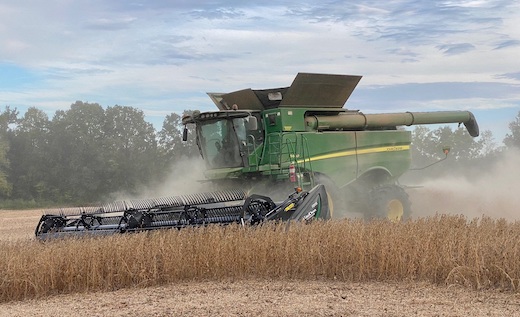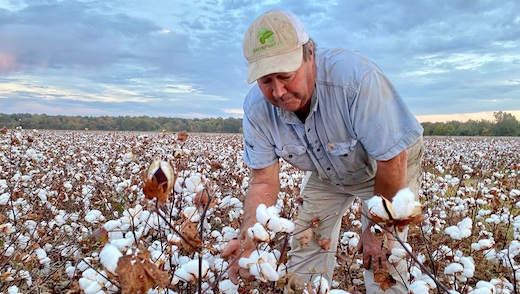FINDING EFFICIENCIES THAT STREAMLINE COTTON PRODUCTION
Hear from Tennessee producer David McDaniel about why he plants all of his 4,000 acres of cotton to PhytoGen® W3FE varieties.
Hear from Tennessee producer David McDaniel about why he plants all of his 4,000 acres of cotton to PhytoGen® W3FE varieties.
There’s something about growing a cotton crop — a feeling of pride and accomplishment unique to farmers who plant their seed each spring with the hopes of snow-white fields in the fall.
That sense of pride is amplified because cotton production requires keen management to overcome seasonal challenges. But with those challenges comes the potential for big rewards.
West Tennessee producer David McDaniel tackles those challenges head on in Tipton, Fayette and Shelby counties, managing 4,000 acres of cotton, along with 1,500 acres of soybeans and 1,000 acres of corn. While nothing is easy when it comes to farming, McDaniel said choosing the right cotton varieties is a critical step in overcoming production challenges.
“Cotton varieties are personal to farmers. We’ve planted different varieties, but we’ve been really pleased with the PhytoGen varieties the last four to five years,” McDaniel said. “We plant every cotton field to PhytoGen.”
A driving force behind that decision is the challenge of growing both cotton and soybeans, often in fields adjacent to one another. He plants PhytoGen® W3FE varieties and Enlist E3® soybeans, which enables him to use the Enlist® weed control system across both crops. That eliminates a big challenge when it comes to managing weeds.
“Nothing is simple when it comes to farming, especially raising cotton, but the Enlist weed control system is just simpler and easier to use,” McDaniel said. “If we plant PhytoGen varieties and Enlist E3 soybeans, we can use Enlist herbicides on both crops. It eliminates concerns about drift and makes tank cleanout so much easier.”

David McDaniel said PhytoGen® W3FE varieties pair well with Enlist E3® soybeans on his farm due to the synergies in weed management. Since both utilize the Enlist® weed control system, McDaniel has found efficiencies that save time and alleviate challenges on his farm.
Bollworm management is easier too, with WideStrike® 3 Insect Protection that comes in all PhytoGen W3FE varieties. This technology provides three-gene Bt protection against cotton bollworm to protect bolls and potentially decrease insecticide applications.
“WideStrike 3 has been extremely effective on our farm. We very seldom ever have to spray for worms any more. That saves us time and helps our pocketbook,” McDaniel said.
Farming cotton presents challenges every year, but 2022 started off especially difficult for producers in the Midsouth. McDaniel said they had a few heavy rains at planting, followed by big swings in temperature early in the season.
“We had a few days when the high temperatures were record lows, and then a few days in the 100s not long after that,” McDaniel said. “But PhytoGen cottonseed has really good vigor and handled the weather really well.”
As the season progressed, the crop was a little later than usual due to a cool, dry fall, but McDaniel said that helped produce the best grades they’ve ever had.

Tennessee producer David McDaniel said he plants PhytoGen® W3FE varieties on 100% of his cotton acres because of easier management, consistent yield potential and good fiber quality.
As for specific varieties, PhytoGen® brand PHY 360 W3FE has been a consistent performer on a wide range of soils types for several years, and newer PhytoGen® brand PHY 411 W3FE also performed well.
As he looks to 2023, he’ll continue to tackle the challenges of cotton production head-on with the help of a solid team: his wife, Lisa, and their three sons, Jonathan, Jeffrey and Joe. For McDaniel, farming cotton is a generational endeavor, and family plays a big part in his cotton legacy.
“One of the best things about farming is we get to work together every day, to see each other every day. My wife, our sons, our daughters-in-law, my oldest grandson — everyone is helping to do something, whether it’s driving tractors, getting parts or bringing lunch to the field,” McDaniel said. “And we all get together once or twice a month at my mother’s house for Sunday dinner. Seeing everyone and being together is a big benefit for us.”
Find information on yield and more in the PhytoGen Cottonseed Agronomy Library.